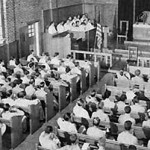Viterra kills Saskatchewan Wheat Pool legacy.
by Dennis Gruending
Farmers fought long and hard to create the Saskatchewan Wheat Pool in 1924. Eighty-eight years later the company, now known as Viterra, is being sold to a Swiss-based multinational called Glencore for $6.1 billion. This is a sad story, a kind of morality tale about the gradual destruction of self-help, local initiative, community control and co-operation. With a few exceptions, there has been virtually no critical media analysis of this event that looks at it from the bottom up.
So, as someone who grew up in a small prairie village where the Wheat Pool elevator and the local Pool committee were fixtures, let me offer some observations. I'll begin with an anecdote. I co-hosted CBC Radio's morning show in Saskatchewan in the 1980s. One day I did an interview with EK (Ted) Turner, a farmer who served for many years as the Pool's president. A disgruntled Pool member had provided me with information about an impending increase in Turner's salary to something like $120,000 per year. The farmer thought this was outrageously high. I asked Turner about it in the interview (I admit it was a bit of an ambush) and he was clearly taken aback. That salary today, if one accounts for inflation, would be about $250,000 per year.
Continue reading »
 Dennis Gruending is an Ottawa-based author and former Member of Parliament. He is also a former director of information for the Canadian Conference of Catholic Bishops. His books include the biography, Emmett Hall: Establishment Radical and his latest book is Pulpit and Politics: Competing Religious Ideologies in Canadian Public Life, recently released by Kingsley Publishing Services of Calgary.
His blog can be found linked below.
Dennis Gruending is an Ottawa-based author and former Member of Parliament. He is also a former director of information for the Canadian Conference of Catholic Bishops. His books include the biography, Emmett Hall: Establishment Radical and his latest book is Pulpit and Politics: Competing Religious Ideologies in Canadian Public Life, recently released by Kingsley Publishing Services of Calgary.
His blog can be found linked below.

